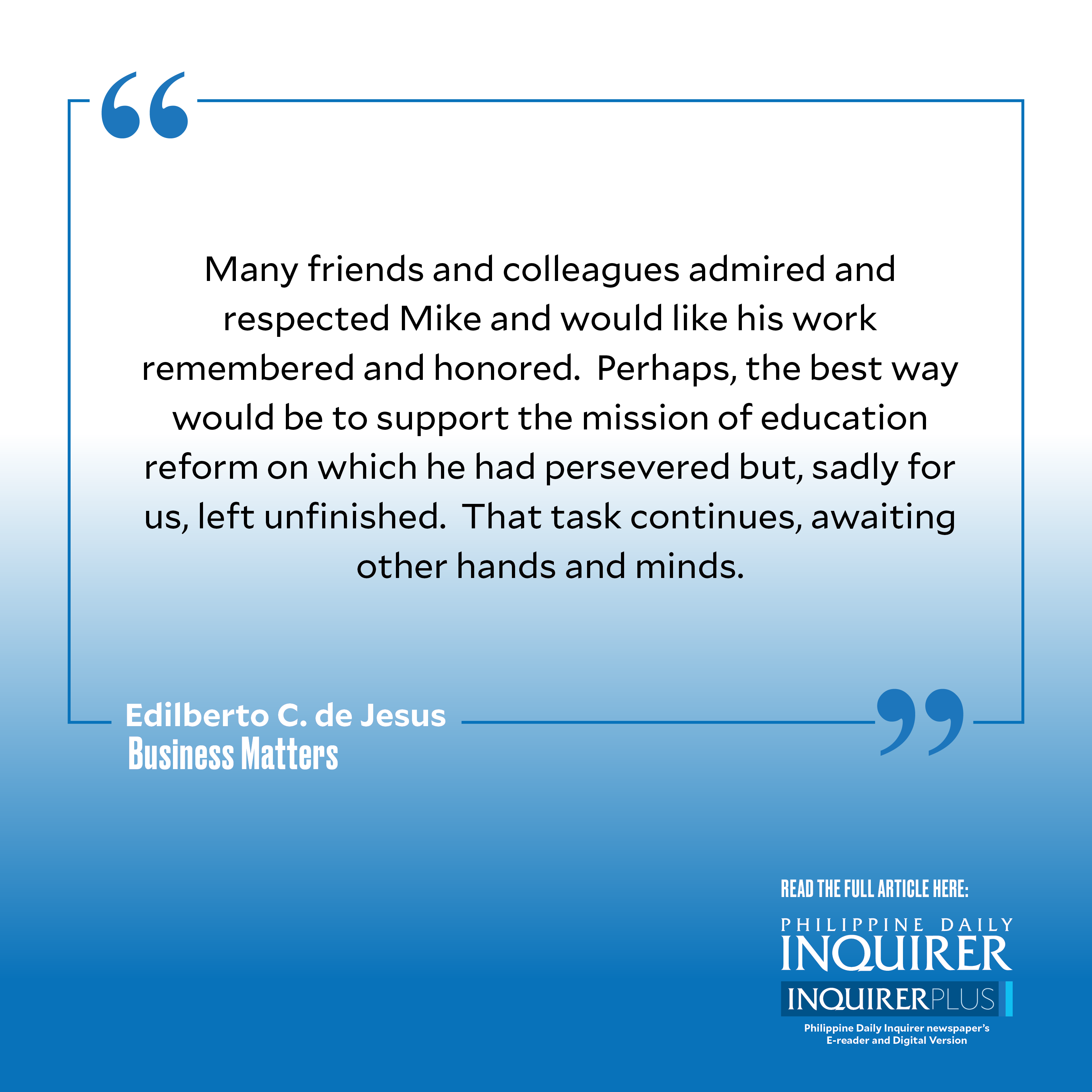Remembering Juan Miguel Luz

Six people joined me in the Department of Education (DepEd) in 2002. Two at undersecretary level: Jose Luis Martin “Chito” Gascon, later human rights chair, for legal, and Juan Miguel “Mike” Luz for finance. The policy measures we pursued during our term passed through a robust process of internal, no-holds-barred consultations. Once decided, the nature of the problems imposed on Mike a great deal of the heavy lifting.
On my first DepEd payday, I received an envelope with peso bills and coins. Salary payment in cash, it turned out, was convenient mainly for lenders or their representatives collecting on DepEd personnel loans. It became Mike’s task to arrange for banking and, where possible, ATM services for a staff complement of 500,000. With almost double the staff strength now, this change is unlikely to be reversed.
Another intervention will remain permanently identified with Mike. DepEd needed to tap the funds and the expertise of the corporate sector. But we also believed it important that local communities learn to support the schools serving their children. Parents could contribute time to help clean up campus and classrooms, perhaps, do some repainting jobs to make the school more pleasant and safer for their children. Mike coined the term “Brigada Eskwela” for this effort. Both branding and program have survived for over two decades.
But the elephant in the room waiting for us at DepEd came via Yvonne Chua’s book, “Robbed: An Investigation of Corruption in Philippine Education.” Taking the beast by the tusks, we focused on textbook procurement, the big-ticket item vulnerable to corruption. Previous contracts had suffered from unqualified bidders, overpriced products, delayed and short deliveries, substandard quality. Mike managed a massive, national textbook supply program to distribute some 50 million textbooks to over 5,500 sites.
The strategy mobilized business enterprises, local government councils, church groups, civil society organizations, and nongovernment organizations to help monitor the bidding process and inspect the number and condition of the textbooks delivered. Their assistance enabled DepEd to drop average unit price from P90 to P41, reduce deficient deliveries to 6 percent of over 2,000 elementary school districts, and cut delivery time from 24 to 12 months, a schedule never met before. Without requiring additional security or confidential, intelligence funds.
We thought we had delivered acceptable results. Some congressmen did not agree. They summoned the DepEd to a congressional hearing to justify that the “rushed” delivery process did not abet corruption. Controlling corruption was crucial; so was delayed textbook delivery, which deprived children of needed learning materials and disrupted the learning process. Delays in addressing the textbook shortage had already led to tolerating a perverse interpretation of the desired one-to-one textbook-student ratio; each child gets a textbook, but not necessarily the same textbook their classmates had.
So, what did we accomplish at DepEd? Truthfully, not much. We achieved some successes during our term of less than three years; we could not ensure their sustainability. At best, we flagged systemic problems, like automatic promotion, and addressed them when we could. Perhaps, we suggested that the DepEd mandate was not mission impossible and a functional education agency, not an impossible dream.
We had hopes, but no illusions. Mike also had resilience and resolve. He accepted our failure but refused to give up. Despite health issues that he suffered with fortitude and grace, he remained engaged in the efforts of private and public think tanks to probe the problems of the educational system.
Mike would have welcomed the Second Congressional Commission on Education announcement that the University of the Philippines President Edgardo J. Angara Fellowship program will conduct research on 20 policy issues affecting education and training. These should answer questions that have baffled both of us. How did explicit plans to decongest the basic education curriculum lead to even greater curricular congestion? How was corruption in computer procurement possible? Assuming top management was not complicit, what elements of the operating systems had to fail for such a crime to progress during our watch with neither of us detecting it?
Many friends and colleagues admired and respected Mike and would like his work remembered and honored. Perhaps, the best way would be to support the mission of education reform on which he had persevered but, sadly for us, left unfinished. That task continues, awaiting other hands and minds.
—————-
Edilberto C. de Jesus is professor emeritus at the Asian Institute of Management.
—————-
Business Matters is a project of the Makati Business Club (makatibusinessclub@mbc.com.ph).
















